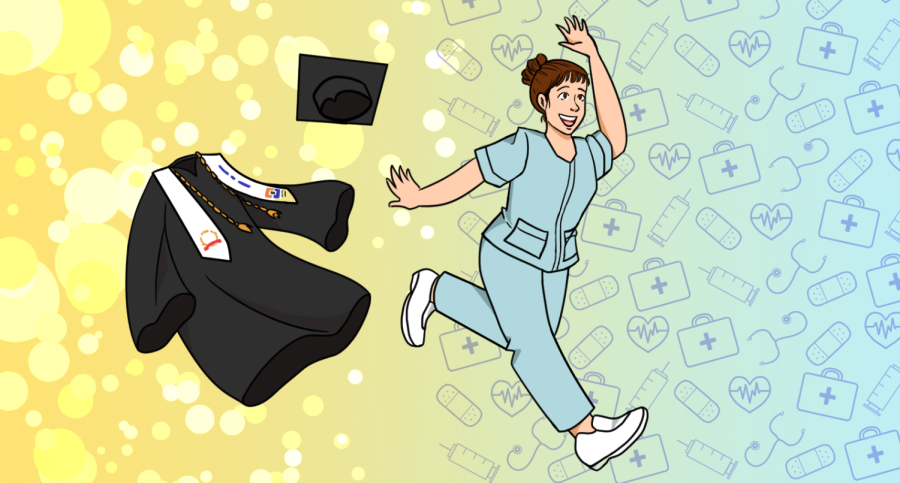Dallas College preparing to offer bachelor’s in nursing
April 5, 2022
Dallas College has been approved to develop a Bachelor of Science in Nursing program.
Juanita Flint, founding dean for the bachelor’s degree in nursing and former Vice Provost of the School of Health Sciences, said there is no starting date for the program yet. It still needs approval from four different agencies, including the Texas Higher Education Coordinating Board and the Texas Board of Nursing.
“It’s a long process,” Flint said. “It’s not something that you do overnight.”
Flint said the BSN program will be entirely online and not involve any clinicals in local hospitals.
Applicants may come from any state but must have an unrestricted license to practice from their state’s board of nursing and a clear background check and drug screen.
Flint said there is a nursing shortage everywhere in the United States and Texas needs about 20,000 more to meet current demand.
“[The BSN program] will make a big difference in us helping to supply the nursing shortage pipeline here in Dallas,” Flint said.
Steve Love, president and chief executive officer of the Dallas-Fort Worth Hospital Council, spoke about some reasons for the healthcare worker shortage at the Feb. 1 Dallas College Board of Trustees education committee workforce meeting.
“Workforce is aging,” Love said. “The average age of nurses especially continues to increase. We have quite a few people retiring and leaving the workforce. In addition to that we’ve got the pandemic . . . and our workforce, in addition to what they were dealing with previously, is tired.”
Flint, a nurse practitioner, said burnout in the nursing profession is very real. Nursing is a physically demanding job some people can do for an extended length of time and others can’t.
She’s known nurses who said they never want to set foot in a hospital again, especially after the COVID-19 pandemic.
“It’s just hard, hard work to do,” Flint said. “You stand on your feet 12 hours a day and you’re at everybody’s beck and call and you’re lifting heavy people and moving them and, you know, doing all sorts of physical activity. Plus you’re thinking on your feet the whole time.”
[READ MORE: Upward Bound gets students off the ground]
Flint said an associate degree in nursing makes students eligible to take the national licensing exam and become registered nurses, but a bachelor’s degree will make them more competitive in the workforce.
Hospitals aspire to Magnet status, a designation for medical facilities that offer the highest quality of nursing care. In order to qualify, Flint said at least 80% of their registered nurses must have a bachelor’s degree.
Even though local hospitals regularly hire graduates from Dallas College’s Associate Degree Nursing program, Flint said many times their contract stipulates they have to obtain a bachelor’s degree over the next few years.
“All the students know basically when they enroll in our [associate degree] program this is not the end for them,” Flint said. “They’re still going to have to go back and get that bachelor’s degree.”
According to Flint, there are currently around 600 students enrolled in the ADN program.
She said the BSN program is a great option for Dallas College students because the tuition will stay the same — $79 per credit hour.
“I have over 300 [nursing] students saying if they could sign up today, they would sign up and commit to staying here and completing their bachelor’s degree,” Flint said.
[READ MORE: Nursing student shares life lessons learned from family]
Right now Dallas College offers an ADN program at Brookhaven, El Centro and Mountain View.
Greg Morris, Senior Vice Provost of Academic Services, said at the Feb. 1 education workforce meeting that the three ADN programs will combine this fall to fit the new Dallas College model.
According to Morris, the percentage of graduates who pass the licensing exam and become registered nurses is 86.9% for Brookhaven, 90.4% for El Centro and 100% for Mountain View.
“We’re still really maintaining good passage rates,” Morris said.
Flint said the Texas Higher Education Coordinating Board requires bachelor’s programs to specialize and not duplicate what the college already offers.
To satisfy that requirement, the BSN program will include information on cultural awareness in healthcare and a medical terminology course in Spanish.
“We’re hoping that these students, after they finish it, they can qualify to take a medical interpreter certificate and get that,” Flint said. “And coupled with their diplomas, they have an added asset that they can take for their employment.”




